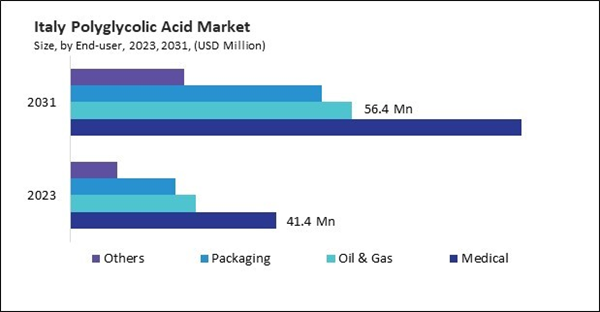Polyglycolic acid (PGA) films represent a cutting-edge development in biodegradable polymer technology. These films are created through the polymerization of glycolic acid molecules, resulting in a versatile material with a range of valuable properties. PGA films are known for their exceptional strength, flexibility, and biocompatibility, making them highly desirable for numerous applications. Therefore, the Germany would utilize 1,439.0 tonnes of Polyglycolic Acid in films segment by 2031.
The Germany market dominated the Europe Polyglycolic Acid Market by Country in 2023, and would continue to be a dominant market till 2031; thereby, achieving a market value of $636.7 million by 2031. The UK market is exhibiting a CAGR of 8.2% during (2024 - 2031). Additionally, The France market would experience a CAGR of 9.9% during (2024 - 2031).
The market is witnessing several notable trends and innovations shaping its trajectory and expanding its application horizons. One prominent trend is the development of bio-based feedstocks for PGA production, moving away from fossil fuel-derived sources towards renewable resources such as biomass or agricultural waste. This shift towards bio-based production enhances PGA's sustainability credentials and reduces its environmental impact and dependence on finite resources.
Another significant trend in the market is the exploration of advanced processing techniques and formulations to improve its mechanical properties and performance characteristics. Innovations in polymer blending, copolymerization, and nanostructuring yield PGA materials with enhanced tensile strength, toughness, and thermal stability, widening its application scope in industries with essential high-performance materials.
According to the Eurostat data, in 2020, Germany exhibited the most substantial healthcare expenditure of any EU Member State, amounting to a staggering €432 billion. Following Italy ($160 billion) and Spain ($120 billion) were France ($281 billion) in terms of current healthcare expenditures. Germany and France, in comparison to all other EU Member States, exhibited the highest levels of current healthcare expenditure at 12.8% and 12.2% of GDP, respectively.
Following Austria (11.5%) were Sweden (11.4%), the Netherlands (11.1%), and Belgium (11.1%), in that order. Only Denmark, Spain, and Portugal among the European Union Member States maintained double-digit ratios. In 2020, Luxembourg and Denmark exhibited the highest current healthcare expenditures among EU Member States, measured in euros and per capita, respectively (€5,875 and €5,642, respectively). Thus, the growing healthcare sector in Europe will assist in the expansion of the regional polyglycolic acid market.
Based on Form, the market is segmented into Fibers, Films and Others. Based on End User, the market is segmented into Medical, Oil & Gas, Packaging, and Others. Based on countries, the market is segmented into Germany, UK, France, Russia, Spain, Italy, and Rest of Europe.
List of Key Companies Profiled
- BMG Incorporated
- Huizhou Foryou Medical Devices Co., Ltd. (GL Capital Group)
- Unisur Lifecare Pvt Ltd
- Orion Sutures India Pvt Ltd
- Kureha Corporation
- Shenzhen Polymtek Biomaterial Co., Ltd
- Haihang Industry Co., Ltd. (Haihang Group)
- Polysciences, Inc.
- Teleflex Incorporated
- Merck KGaA
Market Report Segmentation
By Form (Volume, Tonnes, USD Billion, 2020-2031)- Fibers
- Films
- Others
- Medical
- Oil & Gas
- Packaging
- Others
- Germany
- UK
- France
- Russia
- Spain
- Italy
- Rest of Europe
Table of Contents
Companies Mentioned
- BMG Incorporated
- Huizhou Foryou Medical Devices Co., Ltd. (GL Capital Group)
- Unisur Lifecare Pvt Ltd
- Orion Sutures India Pvt Ltd
- Kureha Corporation
- Shenzhen Polymtek Biomaterial Co., Ltd
- Haihang Industry Co., Ltd. (Haihang Group)
- Polysciences, Inc.
- Teleflex Incorporated
- Merck KGaA









